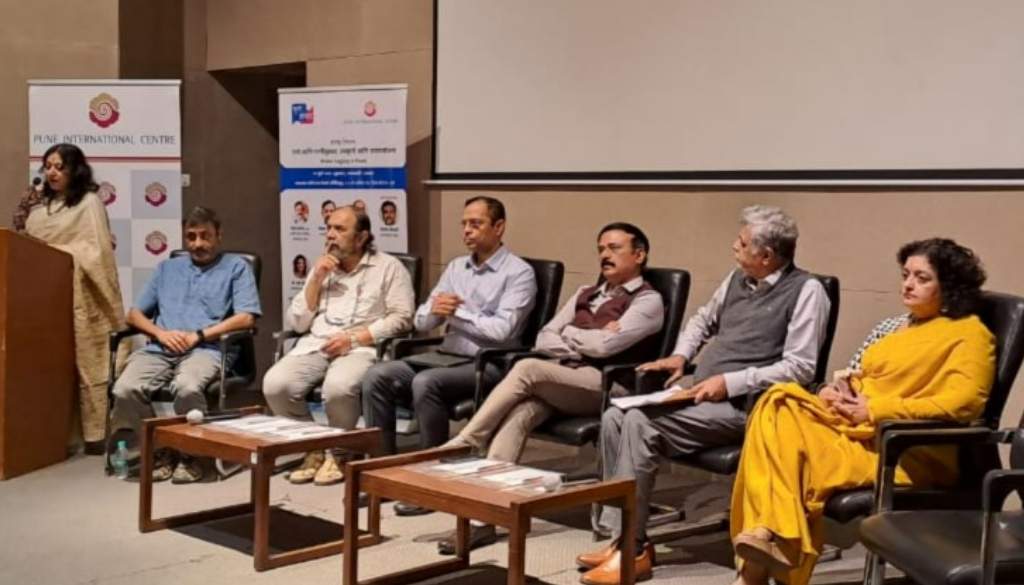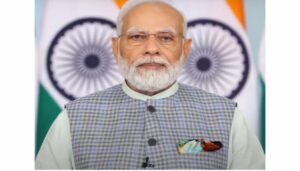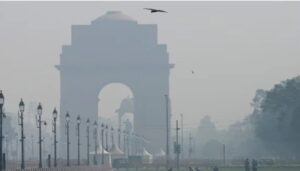Inadequate Drainage, Encroachments, Poor Planning Blamed For Pune’s Flooding Woes

Pune, 20th July 2024: Inadequate drainage systems, coupled with poor urban planning, are contributing to Pune’s recurrent flooding issues. Encroachment of nalas and low water percolation due to extensive ground concretisation have increased water runoff and flooding challenges. To tide over this problem, the city needs better flood control mapping, dedicated department for flood water management, and positive citizen involvement.
These were some of the key issues highlighted by experts and citizens alike at Pune International Centre’s ‘Pune Samwad’ on ‘Raste Aani Paanitumbaara: Aavhane Aani Upayyojana (Roads and Waterworks: Challenges and Solutions)’.
Pointing to encroachment of nalas as a major cause of flooding, Mahesh Zagade, former Principal Secretary, Maharashtra, and Member, PIC, underscored the need to clear and prevent the encroachments and called for clear policies and centralised efforts in development planning. He said there are technological solutions for waterlogging on asphalted roads and urged citizens to be proactive in getting the authorities to act and implement the solutions.
Drawing attention to the Ambil Odha flooding that claimed 25 lives in 2019, Sarang Yadwadkar, member, Development Plan of Pune City, cautioned that current flood events may just be a preview of future challenges as Pune is vulnerable to frequent climate change-induced cloudbursts. He said the steep nature of the upstream areas, sedimentation, reduced river capacity due to encroachments, and deforestation of hillocks (tekdis) would lead to increased runoff and flooding. Observing that Pune city has grown beyond its carrying capacity, he suggested developing the rural areas.
Vivek Kharwadkar, architect and town planning expert, stressed on including Pune’s unregistered nalas and using engineering solutions in urban planning strategies. He called for a dedicated storm-water management department and active citizen suggestions and participation in implementing solutions.
Pointing out that storm-water drains are only the end stage in water flow, Dr. Gurudas Nulkar, Member, PIC, and Director, Centre for Sustainable Development at Gokhale Institute of Politics and Economics, said urban planners need to have a better idea of water flow channels and the impact of urbanisation on them. He said hard-flooring has contributed to low water percolation. Dr. Nulkar urged for sustainable urban planning practices such as considering the carrying capacities of areas in granting FSI, and managing water at upstream levels while implementing technological and engineering solutions at downstream levels.
Poorva Keskar, environment consultant, and Director, VK:e Environmental, called for institutional mechanisms for effective implementation of town development plans and even a rethink of UDCPR (Unified Development Control and Promotion Regulations, aimed at merging villages into PMC to simplify procedures). To enhance percolation, she proposed green roofing and water harvesting, utilising mandatory open spaces on plot peripheries, and avoiding concretisation of footpaths and cycle tracks.
The session, moderated by architect and urban designer Shirish Kembhavi and anchored by PIC member Swati Raje, concluded with a spirited exchange of ideas from the audience, who expressed frustration over the state of roads and flooding incidents, and contributed suggestions.
At the end of the discussion, Prof. Amitav Mallik, head of PIC’s research vertical Energy, Environment and Climate Change, urged the audience to contribute their suggestions to Pune International Centre and participate actively in shaping urban strategies. “This is a beginning. Let us plan for 2047,” he said.








